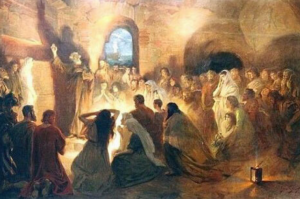A Sermon by the Rev. Dr. Arthur M. Suggs
Preached on the Feast Day of Saints Peter and Paul, June 24, 2018.
A Feast Day for Saints Peter and Paul; A Gesture for Friendship, but no Reconciliation or Union Arises.
Today is the feast day for Saints Peter and Paul. This is observed not so much by Protestants but more by the liturgical traditions, Roman Catholics, Episcopalians, and so forth.
Don’t expect a real feast, but the occasion is a commemoration of their martyrdom under the reign of Nero in Rome.
It is a special day for Roman Catholics in particular because this is when representatives of the Eastern Orthodox church travel to Rome to be with the pope as they celebrate this important day.
It is a token gesture toward friendship renewal, although not anywhere close to reconciliation or union, which was broken during the Eleventh Century when Pope Leo IX in Rome demanded allegiance from the independent Eastern church in Constantinople. Rome will return the favor on the feast day of Saint Andrew in the autumn by sending a delegation to Istanbul.
Most of you probably don’t generally care much about such ecclesiastical matters.
I only care minimally, but I thought you might find the Great Schism of 1054 interesting.
Gestures toward friendship where there has been enmity for over a millennium are important, and actually could be of great importance.
In addition, I thought it might be an opportune time to look at some of the teachings of Saints Peter and Paul on this revered feast day.
Team of Rivals Is a Fascinating Moment in History; Creative Genius Springs up in Both Camps.
First, I need to tell you about some facts I learned from a marvelous book I have been reading. In 2005, Doris Kearns Goodwin published Team of Rivals: The Political Genius of Abraham Lincoln.
“The book is a biographical portrait of Lincoln and some of the men who served with him in his cabinet from 1861 to 1865. Three of his cabinet members had previously run against Lincoln in the 1860 election: Attorney General Edward Bates; Secretary of the Treasury, Salmon P. Chase; and Secretary of State, William H. Seward. The book focuses on Lincoln’s mostly successful attempts to reconcile conflicting personalities and political factions on the path to abolition and victory in the American Civil War.” — Wikipedia
It is, of course, a fascinating moment in our history.
But there is one facet to the story that left me utterly astounded. It had to do with the creative genius, not of Lincoln, but rather of the men who didn’t want to give up slavery, and envisioned a dozen or so different ways to thwart, eviscerate, delay, or otherwise prevent abolition.
Here are three quick examples:
1. Let’s make abolition a “states’ rights” thing, where, rather than a national law, let the states decide, some allowing it and others not allowing it.
2. Let’s keep the slaves for the time being. However, on a given date, sometime in the future, children born to slaves would be free.
3. The U.S. Constitution already had language to the effect that those who were bound in some way were to be accounted as three-fifths of a person.
Proponents of this lunatic but serious stunt tried to find a way to grant to slaves some of the rights of free people, but just not all of them.
Article 1, Section 2, Clause 3 of the United States Constitution reads: Representatives and direct Taxes shall be apportioned among the several States which may be included within this Union, according to their respective Numbers, which shall be determined by adding to the whole Number of free Persons, including those bound to Service for a Term of Years, and excluding Indians not taxed, three-fifths of all other Persons. (Boldface type added.)
A position somewhere between 100 percent legal slavery and 0 percent legal slavery was propounded by various politicians who envisioned a dozen or so different ways to land somewhere in the middle, to avoid the theological, legal, and moral statement that slavery should no longer exist in our land.
![]() Southern Politicians Also Show
Creative Genius; Peter and Paul
Show Holy Spirit Within People.
Southern Politicians Also Show
Creative Genius; Peter and Paul
Show Holy Spirit Within People.
As I read Goodwin’s book, I felt historically naïve. In my grade-school imagination, I somehow thought it came down to a vote of whether to have slaves or not.
That would have been so simple. But rather, it was this extraordinarily difficult political process of withstanding all those many “reasonable” compromises — compromises that made garnering the necessary votes more likely easier, but that stopped short of ridding the land of slavery.
What astounded me was the creative genius of southern politicians in coming up with those gutless, halfhearted, and morally deficient compromises. It was their genius pitted against Lincoln’s genius.
I see the same genius at play in the way in which human beings avoid some of the clear teachings of Peter and Paul.
I will happily acknowledge that both Peter and Paul wrote many things that are difficult to swallow.
Both Peter and Paul were completely and profoundly dualistic in their view of the world and specifically what a human being is — that is, both sinner and saint.
(Sometimes it’s hard-core sinners capable at least of being a saint, and at other times it’s saintly people lapsing into sinnerdom.)
On this feast day, however, let me at least point out some of the things the two apostles said about you and me, four of them:
- Paul — I Corinthians 6: 18: “Do you not know that your body is a temple of the Holy Spirit within you, which you have from God, and that you are not your own.”
- Paul — Galatians 3: 26-29: “For in Christ Jesus you are all children of God through faith. As many of you as were baptized into Christ have clothed yourselves with Christ. There is no longer Jew or Greek, there is no longer slave or free, there is no longer male and female; for all of you are one in Christ Jesus. And if you belong to Christ, then you are Abraham’s offspring, heirs according to the promise.”
- Paul — II Corinthians 3: 18: “And all of us, with unveiled faces, seeing the glory of the Lord as though reflected in a mirror, are being transformed into the same image from one degree of glory to another; for this comes from the Lord, the Spirit.”
- Peter — II Peter 1: 3-4: Then comes the important one. “His divine power has given us everything needed for life and godliness, through the knowledge of him who called us by his own glory and goodness.
Thus he has given us, through these things, his precious and very great promises, so that through them you may escape from the corruption that is in the world because of lust, and may become partakers in the divine nature.”
The Church Understands Spiritual Worth of Humanity; 19 Authors Thwart, Eviscerate, Delay, Prevent.
In preparation for this sermon, I’ve been reading a book entitled Partakers of the Divine Nature: The History and Development of Deification in the Christian Traditions.
It is a compilation of essays edited by a pair of Methodists from Drew University, Michael J. Christensen and Jeffery A. Wittung. It’s a comprehensive collection of 19 essays by Eastern Orthodox authors, some by Roman Catholics, some by Protestants.
Never have I been so enticed by the promise of a good book. That is how the church in all its variety has understood such passages as I just read pointing to all the supreme spiritual worth of every human being.
The volume focuses on a theological understanding of what the Church Father Athanasius, Bishop of Alexandria, said so many centuries ago, “For the Son of God became man so that we might become God.”
Never have I been so utterly let down upon reading this book to realize that the authors would all have made excellent compromising politicians in finding new and creative ways to keep slavery.
The words that I used before — thwart, eviscerate, delay, prevent — that’s what the 19 authors did to those passages.
Let’s look at the three passages for a moment:
• You are a temple of the Holy Spirit. At a minimum, that means that the God of the Universe, however you conceive of such an entity, dwells within you, abides with you. Perhaps not limited by you, by any stretch, but fully present inside your very being.
• You are a child of God. At a minimum, that means that you are of the same species — parents don’t give lives to a kid that’s of a different species. Whatever divinity is, that’s what you are also, at least in some mystical sense. It also means a relationship with parents and children, in which the child is unbelievably precious to the parent.
• We are being transformed into the same image of God. One of the great mystical teachings of virtually every religion is that we are made in the image of God, “imago Dei” in Latin. B’tselem elohim in Hebrew.
I did my entire doctoral dissertation on what it might mean to be created in the image of God. The word for transformation is “metamorphosis.”
In your own mind, try to get a feeling for what this verse might be saying. At a minimum, we are metamorphosing back into that primal, Edenic image of God, fueled by the Spirit dwelling within and further fueled by our royal status as children of God.
• We are partakers of the divine nature. At minimum, this means . . . Wow!
Do We Believe Any of This Stuff? Don’t Be Afraid to Embrace Who You Are; Love Yourself and Others.

Or do we instead believe the narrative that we are miserable sinners, lucky to be getting by?
Chances are that we are somewhere in the middle.
Actually in the middle, just like those politicians trying to preserve some semblance of slavery.
And I’m going to soften my tone about them. It may be the case that they were just afraid. Perhaps some of them were genuinely mean people, who simply didn’t care about an African man or woman, let alone their children. Perhaps a few of them really believed they were subhuman, somewhere around three-fifths.
But I doubt that was true of all those politicians. Rather, they might have been afraid. They might have been thinking . . .
“We won’t be able to get this passed unless we compromise. Everybody knows that.”
“If we get rid of the slaves, it might bring financial ruin upon half the country.”
“If we pass abolition, it might unleash an angry and violent mob of Africans upon the white population. They will want revenge.”
It might have been they were afraid, and in their fear all those potential compromises have a certain appeal.
Don’t be afraid to embrace fully who you are: a Temple for the Spirit, a child of God, being transformed into the full image and glory of the Divine, and a partaker of the Divine Nature.
That is who you fully are, and once you embrace who you fully are then realize that this is also true of the next person of a different race, a different gender, a different class, a different orientation.
It is because we do not fully embrace who we are that all the isms exist at all. If we can’t see it in ourselves, how can we see it in others?
Embrace who you are. Love yourself. And then love others as yourself.
Amen.
Download or view the Proceeding Fearfully sermon as a PDF.
Featured Image credit: Dove with Olive Branch, universal symbol of peace and Holy Spirit. PD image courtesy of George Bog, Wiki.







